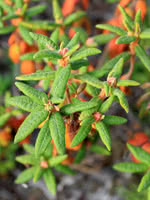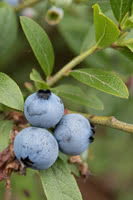Mon-Fri 9am - 5pm Mountain time
Labrador Tea vs Lowbush Blueberry
Rhododendron groenlandicum (Ledum groenlandicum)
Vaccinium angustifolium
NOT AVAILABLE THIS SEASON - MIGHT RETURN
Labrador Tea is slow-growing evergreen shrub native to the boreal forests of Canada.
It thrives in wet, swampy conditions.
Labrador Tea has narrow, leathery, dark green leaves, topped by a cluster of white flowers in the spring. It is a perfect ornamental shrub for boggy, wet areas of your property.
Lowbush Blueberry, commonly known as the Wild Lowbush Blueberry, is often wild-harvested and thrives in low pH acidic soil. This early low-bush blueberry produces white and pink bell-shaped flowers in the spring. Its fruit is smaller in size than high bush blueberry plants and is more flavourful with an intense blueberry taste-masking it perfect for fresh eating, baking, and preserves.
Note: Blueberries require very specific soil conditions. They need well-drained soil with a pH between 4.5 and 5.0. If the starting pH of your soil is between 5.1 and 6.2 you can lower it by adding sulfur. We recommend against planting blueberries in soil with a starting pH greater than 6.2. Please do your own research before buying any blueberry plants.
Labrador Tea Quick Facts
Lowbush Blueberry Quick Facts
Toxicity: slightly toxic if ingested

